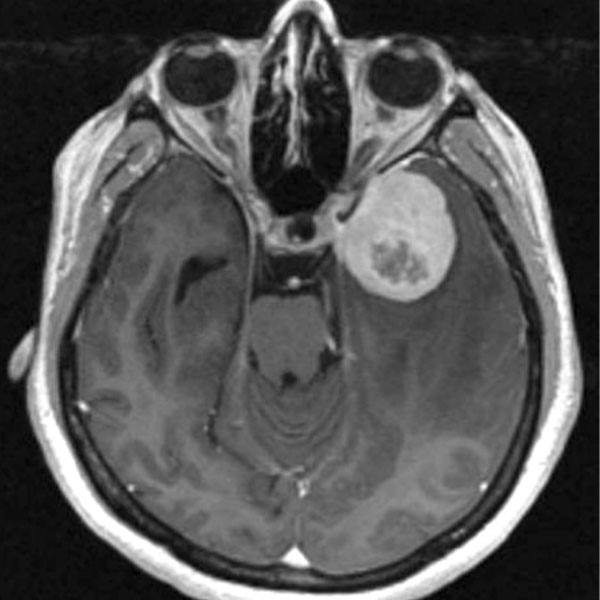Cancer is something no teenager should ever have to go through, but a teen from South Carolina proves that with a smile on her face she could overcome cancer and all the debilitating side effects it threw at her like a rock star.
Journalists: Broadcast-quality video pkg (5:27) is in the downloads. Read the script.
She was a little taller than her friends and perhaps a bit quirky.
"Frank DeFranco," she slyly claims as her name. "But some people pronounce it Julia Fulmer. But I don't understand that."
Julia Fulmer thought of herself as a normal 13-year-old girl, until she found a lump on the back of her head while hanging out at a friend's house.
Her blood work looked normal, but a CT scan showed reason for concern. So doctors biopsied the growth.
"And, then, I get in there and they're, like, 'you have cancer.' And I'm, like, I knew it. Yes. I called it," Fulmer says. "And ─ and so, yeah, it was ─ don't get me wrong. It was ─ it was a sad time, but it was, like, one of those 'Is-this-really-happening?' kind of moments. And, up until, like, maybe a few months ago, I still was, like, having trouble thinking about it because it was just constantly moving and stuff through treatment. You don't really have time to process that you actually have cancer."
She was diagnosed with T-cell acute lymphoblastic leukemia.
For two years she pushed through chemo therapy. She dealt with the nausea. She dealt with wearing masks and going to the hospital for every small fever, ache or pain. She dealt with giving up playing soccer.
And after two years, she is cancer-free. But it came at an unexpected price.
The steroids she took with the chemo caused severe avascular necrosis. Her bones degraded to the point she had to leave her home in South Carolina and come to Mayo Clinic's Rochester, Minnesota, campus for not one, but two, hip replacements.
"Before the first surgery, I wasn't able to, like, move my legs apart, like, at all hardly," Fulmer says. "And it was really, really hard for long distances. And just ─ it was pain and pain and pain. And I was just done with it ─ wanted to get it over with. And so ─ so we came to get the hip replacement because the bone was at this point very, very much so degraded. And we just wanted to stop ─ stop the pain there."
Her first hip replacement was in March. The second was in late July.
Between two years of cancer treatment ─ and now two hip replacements ─ it has been tough at times for Julia not to lose hope and not feel like she lost part of her childhood.
But she says she has found ways to stay positive through it all.
She's an aspiring filmmaker.
She's also gotten a boost from organizations such as Star Treatments.
"I remember how cool it made me feel the first time we got on, like, a tour bus, or got to show up to places, you know, in a fancy ride," Matt DiRito, founder of Star Treatments, says. "And just thinking back on, you know, being that age, like, how excited that would make me.
DiRito travels the country in a tour bus as the bass player for a rock and roll band called Pop Evil. He started Star Treatments as a way to get sick kids to and from important appointments in style, hoping that the excitement of a limo ride would overshadow the pain or fear of the treatment.
"She can either be in a limo or a party bus with her family, and have her legs stretched out and not have to worry about straining that hip back and forth to the airport," DiRito says.
For Julia, DiRito took it a step further, and made sure her 6-foot frame could fly to Minnesota for her surgeries comfortably in first class.
"When we rode on the commuter jets, the ─ like, I didn't think that it would be that bad, but when you're, like, you know, nine days, eight days after surgery, and it's pressing up against the hip, it's going to hurt," Fulmer says. "And, so, I mean, at first, when we went there, I was, like, hey, this is kind of nice. You know, I could get used to this. And then ─ and then on the way home, I was, like, oh, my goodness. This actually helps so much. This isn't just for glamour. This is amazing."
And, while a comfortable first-class ride may not seem like much after cancer and two major surgeries, Julia's hip surgeon, Mayo Clinic's Dr. Daniel Berry, says things like that can have a huge effect on outcomes.
"One of the things that I tell patients when they come in and are doing really well after surgery, they oftentimes say thanks, and I say, you know, I'll take a little bit of the credit, but I also tell them that I think the most important factor for how patients do after surgery has to do with their outlook on life and their attitude," Dr. Berry says. "If people go into it with a positive attitude ─ if they feel like they're going to be able to overcome the obstacles that surgery always throws at them, pain, challenges getting going again ─ most of the time if the operation is a good operation, they don't have problems related to the surgery, itself. They're going to do really, really well. And I think it's the single biggest factor that determines the outcome of surgery."
Dr. Berry says staying positive likely played a big role in getting Julia through her cancer treatment and her surgeries. He says it's why Mayo Clinic tries to look beyond just the surgery or just the cancer and treat the whole patient.
Julia says the whole-pictures approach has definitely made things easier for her to focus on getting better, rather than on her pain.
"But, it's just everything here is, like, so orchestrated to make the best experience, and, like, everything moved so efficiently and quickly, and it's, like, whoa, why aren't they doing this everywhere else? But it's been great," Julia says.
After three years that have been tough enough to break almost anyone, Julia says her religious faith, a better hospital experience at Mayo, focusing on her hobby of film-making, and organizations such as Star Treatments making life a little easier have allowed her to get through it all with a smile on her face.
"It's made a lot of difference, 'cause, you know, it's, like, if you don't have anything to look forward to, then it's, like, OK, we're going to get this done," she says. "And, then, you're going to get this done, and then this done, and then this done. But a lot of the positive events, you know, sprinkled about, you know, you can get through the day. But I don't really want to wish away my time, so you just kind of make the best out of every situation, regardless of if it's a happy time or not."







